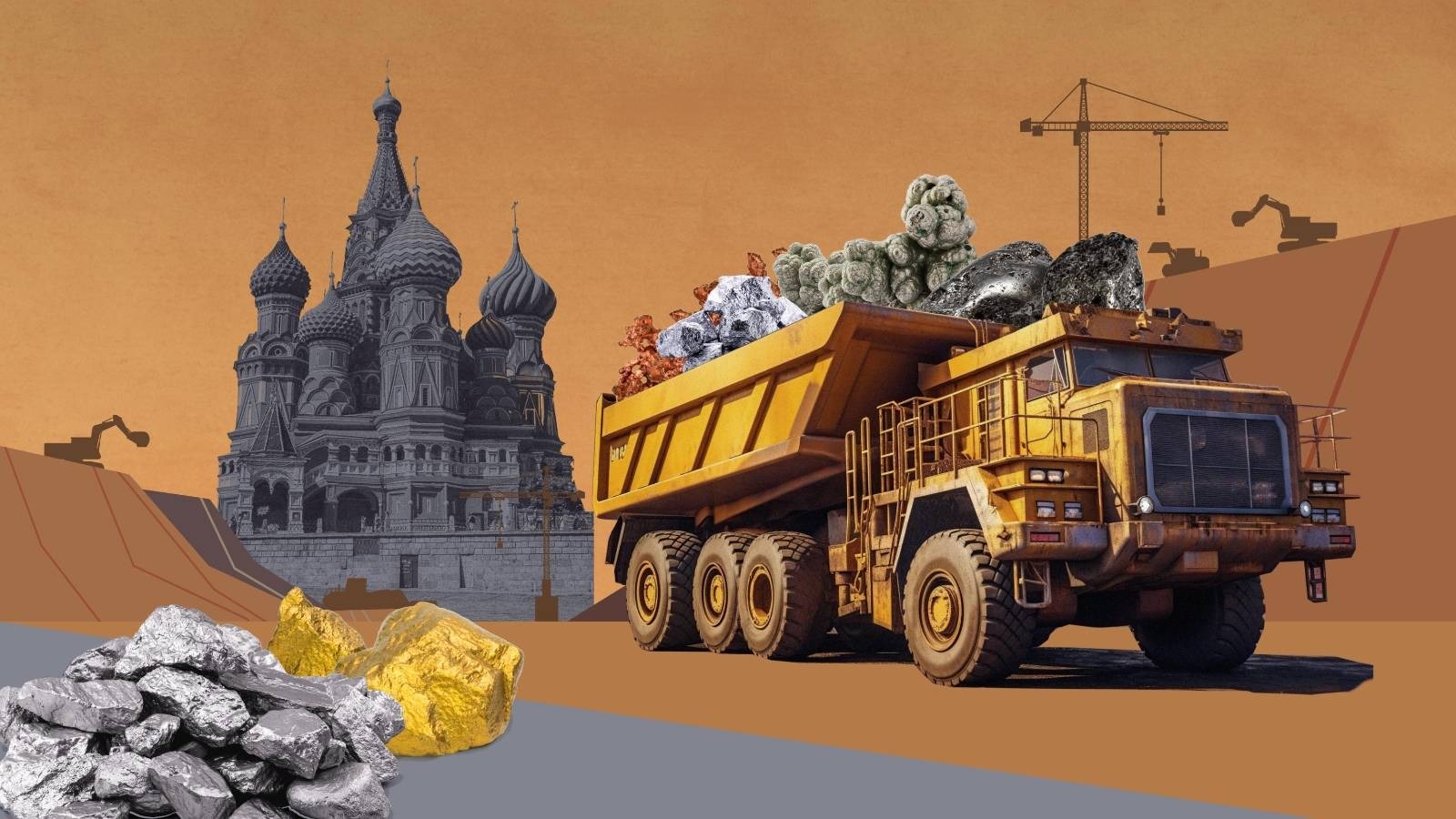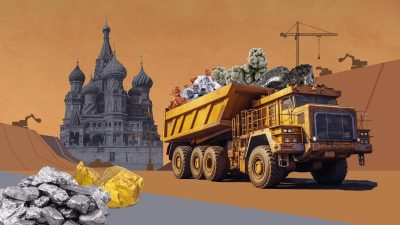Illustration: Alexia Barakou 2023-10-30
Illustration: Alexia Barakou 2023-10-30
Despite a raft of sanctions now in place against Moscow, the critical raw materials trade remains exempt and EU purchases persist. Investigate Europe analysis finds European companies continue to pour billions into mining firms linked to the Kremlin.
Since Russia’s invasion of Ukraine in February 2022, the 27 EU countries have adopted 11 sanction packages, targeting raw materials including oil, coal, steel and timber. But minerals that the EU considers as “critical” raw materials – 34 in total – still flow freely from Russia to Europe in vast quantities, providing crucial funds to state enterprises and oligarch-owned businesses.
This article was originally published on investigate-europe.eu.
While some of its western allies have targeted Russia’s mining sector – the UK recently banned Russian copper, aluminium and nickel – the EU has continued its imports. Airbus and other European companies are still buying titanium, nickel, and other commodities from firms close to the Kremlin more than a year after the invasion, Investigate Europe can reveal.
Between March 2022 and July this year, Europe imported €13.7 billion worth of critical raw materials from Russia, data from Eurostat and the EU’s Joint Research Centre shows. More than €3.7 billion arrived between January and July 2023, including €1.2 billion of nickel. The European Policy Centre estimates that up to 90 per cent of some types of nickel used in Europe comes from Russian suppliers.
“Why are critical raw materials not banned? Because they are critical, right. Let’s be honest,” the EU’s special envoy for sanctions, David O’Sullivan, pithily said at a September conference.
The Union is desperate for critical raw materials to achieve its aim of climate neutrality by 2050. These commodities are crucial for electronics, solar panels and electric cars, but also for traditional industries like aerospace and defence. Yet they are all too often in scarce supply, unevenly available across the globe, and in high demand.
“The war in Ukraine has clearly shown the willingness of Russia to weaponise the supply of key resources. As Europeans, we cannot tolerate that,” says Henrike Hahn, a German Green MEP working on the new Critical Raw Materials Act.
Europe’s imports not only fund Russia’s war economy, but also benefit Kremlin-backed oligarchs and state companies. Although the EU has targeted some shareholders, Russia’s mining businesses have faced no restrictions. The loophole is even more glaring that the US and the UK sanctioned several firms directly, further isolating the EU in its double standards.
Analysis of Russian customs data shows that Vsmpo-Avisma, the world’s largest titanium producer, sold at least $308 million of titanium into the EU via its German and UK branches between February 2022 and July 2023. It is part-owned by Russia’s national defence conglomerate, Rostec. The two companies share the same chairman: Sergei Chemezov, a close Putin ally. The pair were KGB officers in East Germany in the 1980s.
Both Chemezov and Rostec are under EU sanctions and helped supply tanks and weapons to the Russian army. Brussels has not sanctioned Vsmpo-Avisma directly, but the US did ban exports to the firm on 27 September, saying it was “directly involved in producing and manufacturing titanium and metal products for the Russian military and security services.”
Among Vsmpo-Avisma’s largest European customers is Airbus, the aerospace giant partly owned by the French, German and Spanish states. Between the start of the war and March 2023, Airbus imported at least $22.8 million worth of titanium from Russia; a fourfold increase in value and tonnes compared to the previous 13 months.
From 14 March 2023, Vsmpo-Avisma stopped identifying buyers in customs filings but nothing indicates a significant change in trends. Titanium imports to France only slightly decreased between then and July 2023, and Airbus still listed the company as a supplier in July.
“We have no comment on the details and evolution of our titanium sourcing volumes,” an Airbus spokesperson said. “Generally speaking, Airbus is currently ramping up commercial aircraft production and this is having a mechanical impact on its overall procurement volumes.” Even though it will take time, the group is reducing its dependency on Russia, the spokesperson said, adding that a ban on Russian titanium for civil aviation would “encourage the Russian industry to focus on defence needs.”
Unlike Vsmpo-Avisma, other Russian companies have avoided naming their buyers in customs filings altogether. Yet the data still gives a scale of their fruitful relationship with the west. Nornickel, the world leader in palladium and high-grade nickel, exported $7.6 billion worth of nickel and copper into the EU via Finnish and Swiss subsidiaries between the start of the war and July 2023. It also sent over $3 billion of palladium, platinum and rhodium into Zurich airport. In 2022, almost 50 per cent of Nornickel’s sales went to Europe. Brussels has not sanctioned the group nor its chairman and largest shareholder, Vladimir Potanin, an oligarch and former deputy prime minister under US and UK sanctions.
Aluminium giant Rusal also uses tax havens to funnel minerals to Europe, where it owns the EU’s largest alumina refinery in Ireland and a smelter in Sweden. Its Jersey and Swiss-based trading houses brought at least $2.6 billion of aluminium into the bloc in the 16 months following the invasion of Ukraine. In August 2023, Rusal said Europe still accounted for a third of its revenues. Rusal’s main shareholder is oligarch Oleg Deripaska, sanctioned by the EU and its western partners.
Anti-corruption NGO Transparency International says it does not make sense that the sector has avoided sanctions given the known links. “They are part of the system and fueling Putin’s war,” says senior policy officer Roland Papp. “So it’s perfectly logical to ban those critical raw materials from Russia, as we did for other sectors and goods.”
Since the start of the war, other European buyers of Russian metals have included Germany’s GGP Metal Powder ($66 million of copper), French arms-maker Safran ($25 million of titanium) and Greece’s Elval Halcor ($13 million of aluminium). Dutch logistics firm C. Steinweg also handled at least $100 million of various critical metals on behalf of its customers.
Safran confirmed they are still buying titanium from Vsmpo-Avismo but are working to reduce their Russia purchases. GGP Metal Powder said “there is no real alternative to our supplier from Russia”. C. Steinweg said they follow all rules and sanctions. Elval Halcor, Vsmpo-Avisma, Rusal and Nornickel did not reply to requests for comment.
At the start of the war, Europe was relying on Russian producers for 30 per cent of its nickel, 35 per cent of its alumina and 15 per cent of its aluminium, according to an internal memo by trade body Eurometaux seen by IE. Russia accounted for 41 per cent of the world’s palladium production, and up to 25 per cent of its vanadium output.
“Russia occupies a large part of Eurasia – it possesses a big part of the strategic reserves of critical raw materials, on par with China,” says Oleg Savytskyi from Razom We Stand, a Ukrainian NGO. Moreover, “the low density of the population, authoritarian control and practical absence of environmental and human rights protections made investments in the mining of Russia’s resources terribly attractive,” he adds.
The EU’s crippling dependency should have been curbed earlier, argues Transparency International’s Papp. “We’ve had enough time to react. The annexation of Crimea dates back to 2014, the invasion of Georgia even dates back to 2008 15 years ago! And what have we done? We’ve increased our dependence on Russia. It was an absolute and serious mistake.”
A Polish diplomat said Poland has pressed the EU to “decouple completely” from Russia in several areas, “but for the sake of unity and efficiency in adopting new sanctions packages we have agreed to postpone particular measures until further discussion.”
As EU sanctions require unanimity among all member states, divergent national economic interests can often water down packages. When the ninth set of sanctions banned fresh investments in Russia’s mining sector in December 2022, it included an exemption to invest in some mining activities for some critical raw materials. As a result, European companies can still pour cash into Russian mines to extract nickel, titanium and other key metals.
The European Commission won’t publicly comment on whether or not it has proposed a ban on critical raw materials. One reason could be that “sanctions are carefully designed to hit their targets while preserving EU interests,“ an EU source told IE.
Weaning the EU off Russia’s critical and strategic materials will be difficult. Replacing suppliers and forging new international partnerships is an arduous process. Finding a raw material, such as titanium or copper, with a similar quality and price of those from Russia is also a challenge.
Imposing tariffs or severing ties too quickly could lead to a global price surge which would harm European buyers while benefiting Moscow. A ban could also prompt India, Iran, and China to intensify purchases, further depleting critical raw material resources for EU industries.
Tymofiy Mylovanov, president of the Kyiv School of Economics, says a ban would be difficult to implement given global demand challenges and Europe’s reliance on Russia. “Overall, with these specific materials, the monetary value of what Russia would lose from the EU import ban, might be smaller than the effect on the EU production,” says Ukraine’s former trade and economic development minister.
UN trading data shows that while EU imports of Russian copper, nickel and aluminium imports have declined in the past two years, nickel and aluminium revenues remained stable. Russia’s nickel sales to the EU were worth $1 billion in the first half of 2021 and were $1.1 billion two years later.
The Union is now trying to reduce its dependency. In March, the European Commission presented its Critical Raw Materials Act (CRMA), a new legislation aimed at reducing EU dependency on third countries for critical raw materials.
“War in Europe is a risk which was not present in the last decades and Russia was known as a reliable supplier,” says German MEP Hildegard Bentele, shadow rapporteur on the CRMA at the European Parliament. “The EU should take immediate action to support European companies to decrease and replace their CRM deliveries from Russia as soon as possible.”
The High Representative of the Union for Foreign Affairs and Security Policy is expected to propose a 12th package of sanctions in the coming weeks, which will be then discussed by member states. Brussels hopes the package will renew pressure on the Russian economy and sap its fighting strength on the battlefields of Ukraine. Restrictions on critical raw materials does not seem to be on the table.
Editor: Chris Matthews
Graphics: Marta Portocarrero
This investigation is supported by Journalismfund Europe’s Investigation Grants for Environmental Journalism.






